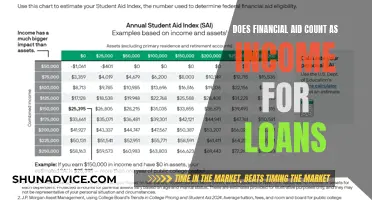
Exit counseling is a crucial step in the federal student loan process, and it can directly impact loan disbursements. It is required for borrowers with federal student loans and helps them understand their loan history, repayment options, and timing. Exit counseling provides monthly payment estimates and information on various repayment plans, aiding students in budgeting and avoiding loan default. It also covers important financial topics such as budgeting, reducing healthcare costs, and understanding interest rates. The specific type of exit counseling depends on the student's status as an undergraduate or graduate. In general, exit counseling is mandatory for anyone who will become legally responsible for making student loan payments. This includes students who are graduating, leaving school, or dropping below half-time enrollment.
| Characteristics | Values |
|---|---|
| Who needs to complete exit counseling? | All students who receive direct subsidized or unsubsidized student loans, PLUS loans, or Federal Family Education Loans (FFEL). |
| Who is exempt from exit counseling? | Private student loan borrowers and Parent PLUS borrowers. |
| When should exit counseling be completed? | Shortly before ceasing to be enrolled on at least a half-time basis. |
| How long does exit counseling take? | 20-30 minutes. |
| What is covered in exit counseling? | Loan history, repayment options, monthly payment estimates, budgeting, and interest rates. |
| What is the purpose of exit counseling? | To help borrowers understand their loans and prepare for repayment. |
| Where can exit counseling be accessed? | studentaid.gov |
What You'll Learn

Exit counseling requirements
Exit counseling is a crucial step in the federal student loan process. It is a requirement for all students who receive direct subsidized or unsubsidized student loans, PLUS loans, or Federal Family Education Loans (FFEL). Private student loan borrowers are not required to complete exit counseling. Exit counseling is typically required when a student graduates, leaves school, or drops below part-time enrollment status.
The specific type of exit counseling depends on whether the student is an undergraduate or graduate. In general, exit counseling is required for anyone who will become legally responsible for making student loan payments. Parent PLUS borrowers are not legally mandated to undergo student loan exit counseling. However, they may benefit from learning about the various repayment plans and loan forgiveness options available to them.
Exit counseling can be completed online through the Federal Student Aid (FSA) website. Students must log in using their FSA ID to access the course. The session typically lasts 20 to 30 minutes and covers various topics, including loan history, repayment options, and budgeting. During the session, students can utilize calculators to estimate their monthly payments and understand the overall budget needed for repayment.
Exit counseling is designed to help students prepare for loan repayment by providing information on the types of student loans, their interest rates, and repayment strategies. It also helps students understand the difference between subsidized and unsubsidized loans, as well as other types of student loans. Additionally, exit counseling ensures that students are aware of the consequences of not maintaining half-time enrollment status and the importance of contacting the appropriate offices if they withdraw from their program.
It is important to note that exit counseling is not a one-time process. If a student drops below half-time status multiple times, they will be required to retake the course. Schools are responsible for documenting that students have received exit counseling and ensuring that experts are available to answer any questions that may arise.
Loans and Financial Intermediaries: An Inevitable Partnership?
You may want to see also

Understanding repayment options
Exit counselling is a requirement for most borrowers by the federal government. It is a crash course in federal student loans, taking between 20 and 30 minutes to complete. It is designed to help borrowers understand their repayment options and prepare them to start repaying their loans. Exit counselling is also a requirement for first-time borrowers before they can receive their first disbursement of a Direct Loan.
Borrowers can choose from four types of federal student loan repayment plans. The best option for you will depend on your financial situation, the type of loan you have, how much you owe, and your income. Federal student loans offer the most flexibility in repayment options, while private student loans are more limited.
If you have a high debt total and low salary, an income-driven repayment (IDR) plan may be the best option. IDR plans tie the amount you pay to a portion of your income, typically between 10% and 20% of your discretionary income. Payments can be as little as $0 if you are unemployed, and they change annually. IDR plans extend the length of your loan to 20 or 25 years, and at the end of the term, any remaining debt is forgiven. However, you may have to pay taxes on the forgiven amount.
If you have a low balance and a sizable income, the standard repayment plan may be a better option. With this plan, you make equal monthly payments for 10 years, and you will pay less in interest overall. This option is also better if you want to pay off your debt sooner.
There are other options available if you are unable to keep up with your regular loan payments. Depending on your lender, you may be eligible for a deferment or forbearance period. You might also consider refinancing your private loans to get a lower interest rate, but this typically requires a credit check. It is important to understand the various repayment options and how they will impact your overall interest payments.
Understanding Excess Distribution: Loan Basis Included?
You may want to see also

How exit counseling affects disbursements
Exit counseling is a crucial step in the federal student loan process. It is a mandatory requirement for students with federal student loans who are graduating, leaving school, or dropping below half-time enrollment. The purpose of exit counseling is to help borrowers understand their loan repayment options and prepare for loan repayment.
During exit counseling, students receive information about their federal student loans, including the total loan amount, repayment terms, and interest accrual. They also learn about different repayment plans, such as the standard repayment plan and income-driven repayment plans, and can use calculators to estimate their monthly payments based on their income and living expenses. This helps borrowers make informed decisions about which repayment plan best suits their financial situation.
Exit counseling also provides an opportunity for students to update their contact information, ensuring that the Department of Education has the most current details for communication regarding their loans. Additionally, it serves as a bridge between being a student and starting loan repayments, helping borrowers understand the importance of repaying their loans and the consequences of defaulting.
While exit counseling is not required for private student loan borrowers or parent PLUS borrowers, it is still recommended as it can provide valuable information about loan repayment strategies and loan forgiveness options. Completing exit counseling ensures that borrowers are well-informed about their financial obligations and can make informed decisions about repaying their student loans.
Explore Loan Recast Options: Not All Lenders Are Equal
You may want to see also

The exit counseling process
The exit counselling process is a crucial step for students graduating or taking a leave of absence with federal student loans. It is a short course, usually between 20 and 30 minutes, that teaches students the basics of repaying federal student loans and budgeting their finances. It is required for federal student loan borrowers when they fall below half-time status (not including summer breaks), graduate, or leave school for other reasons. This process helps borrowers understand their repayment options and decide on a suitable repayment plan.
Exit counselling is required for anyone who will become legally responsible for making student loan payments, including graduating students, those leaving school, or those dropping below part-time enrollment. It is not required for Parent PLUS borrowers, although they may benefit from learning about repayment plans and loan forgiveness options. The process can be completed online on studentaid.gov, where borrowers can access information about their federal student loans.
During exit counselling, participants will review their loan history, learn about the timing and rules of repayment, and explore different repayment options. They will be provided with monthly payment estimates and calculators to understand how much they owe and how to budget accordingly. The session also covers important financial tips, such as budgeting, reducing healthcare costs, and strategies to pay off loans faster. Additionally, participants can update their contact information, ensuring the Department of Education has the necessary details for student loan servicers.
Exit counselling is not a one-time process. If a borrower drops below half-time status multiple times, they will need to repeat the process. Schools are required to document that students have received exit counselling and to make experts reasonably available to answer any questions that may arise after the counselling session. It is beneficial for students to carefully review the information provided during exit counselling and, if needed, seek additional support through one-on-one counselling sessions offered by some institutions.
MPN Student Loans: Who Needs to Fill Them Out?
You may want to see also

Exit counseling for different borrowers
Exit counseling is a crucial step for students graduating or taking a leave of absence with federal student loans. It helps students understand their loans, repayment options, and timing. The specific type of exit counseling depends on whether you are an undergraduate or graduate student. In general, exit counseling is required for anyone who is going to become legally responsible for making student loan payments. This includes students who are graduating, leaving school, or dropping below part-time enrollment.
Federal law requires exit counseling for borrowers with federal student loans. If you don't complete exit counseling, your school may withhold your official transcript and diploma. You will still be able to walk at graduation, but you won't receive your diploma. This can impact your ability to apply to graduate programs or for jobs that require a diploma or transcript.
Exit counseling will help you figure out how much you owe in student loans and what your student loan repayment terms are. It can also help you decide what kind of repayment option is best for your financial situation. For example, if you have a high debt total and low salary, you can opt for an income-driven repayment plan to reduce your monthly payments. On the other hand, if you have a low balance and a sizable income, you can opt for the standard repayment plan to pay off your debt sooner. Exit counseling will also provide several calculators that will show how paying more than the minimum each month can help you pay less interest over the life of the loan.
First-time student borrowers must complete entrance counseling before receiving their first disbursement of a Direct Loan. All student Direct Loan borrowers must complete exit counseling shortly before they cease to be enrolled on at least a half-time basis. Schools must document that students have received both entrance and exit counseling and ensure that an individual with expertise in Title IV programs is available to answer any questions.
The Journey's Loan: A Universal Experience?
You may want to see also
Frequently asked questions
Exit counseling is a vital step in the federal student loan process. It is a short course that teaches you the basics of repaying federal student loans and budgeting your finances. It is required for federal student loan borrowers when they fall below half-time status, graduate or leave school for another reason.
Exit counseling is required for anyone who is going to become legally responsible for making student loan payments. This includes students who are graduating, leaving school, or dropping below part-time enrollment. Borrowers with subsidized, unsubsidized, or PLUS loans under the Federal Direct Loan Program need to complete exit counseling.
Exit counseling does not affect loan disbursement. However, it is required before you can receive your official transcript and diploma. If you don’t complete exit counseling, your school may withhold these documents.







